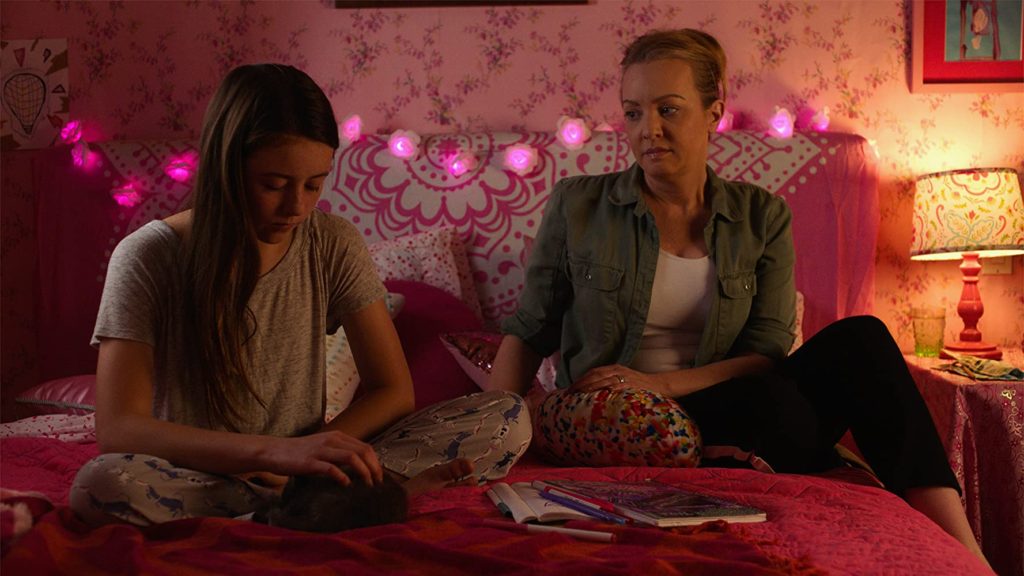Debra Eisenstadt works as a writer, director, producer, and editor. She began her career as an actress, most notably starring in the theater and film versions of David Mamet’s “Oleanna.” Her feature directing credits include “Before The Sun Explodes,” “The Limbo Room,” and “Daydream Believer.” The latter is an Independent Spirit Award winner and took home the Grand Jury Prize at Slamdance. Eisenstadt co-executive produced the acclaimed documentaries “Cobain: Montage of Heck” and the Emmy award-winning “Jane.”
“Blush” hits On Demand April 10.
W&H: Describe the film for us in your own words.
DE: “Blush” is a dark comedy about marriage, motherhood, addiction, and identity.
Wendi McLendon-Covey stars as Cathy, a woman desperate to maintain control and significance amidst fears that her husband’s having an affair and her 13-year-old daughter is becoming estranged. She retreats to her sister’s home where she cat-sits, compulsively cleans, and spies on a neighboring family whose problems seem worse than her own.
One by one these neighbors — a mom, dad, and teenage son — lure Cathy into their lives and trigger her rebellion.
When Cathy becomes the object of the teenage son’s obsession, he threatens to unravel everything, from her precarious marriage to her daughter’s innocence and her own wavering sanity.
W&H: What drew you to this story?
DE: I wanted to write a frightening, funny story that could articulate something about marriage and motherhood that I hadn’t seen before.
I was interested in exploring a character who sacrificed themselves for motherhood and was dealing with the consequences of that choice. Writing from my own fear helped me create this paranoid fantasy.
Much of what I was tapping into was inspired by a parenting group I’d joined when I first became a mother. We met for years, sharing our deeply personal experiences. These stories were often startling, horrifying, and heartbreaking and became the seeds for this script.
What I’ve written is complete fiction, but there’s truth woven in and re-imagined.
W&H: What do you want people to think about after they watch the film?
DE: I hope people enjoy the experience of “Blush” and that they are left with a range of thoughts, feelings, and questions that are personal and meaningful to them.
W&H: What was the biggest challenge in making the film?
DE: We had to shoot 200 scenes in 15 days with no overtime during a heat wave. Getting all those scenes done in that short amount of time was extremely challenging.
W&H: How did you get your film funded?
DE: The script was originally with a producer who was pursuing the project at a much bigger budget. Years went by and it simply wasn’t getting made. I even wrote and directed an entire other film during that period.
Finally, I decided to produce the film myself for a small fraction of that original budget. I cast the film myself, set a start date, and created a pitch deck.
I connected with people I knew and let it be known that I was looking for financing. Someone I’d met, who worked at a film festival I’d been to, connected me with ACE Pictures, a company that was seeking content. They really responded to the script, the pitch deck, and the cast. After our first meeting they came on board to finance the film.
W&H: What inspired you to become a filmmaker?
DE: Filmmaking combines all of my interests and is endlessly challenging. I love collaborating with people who are willing to take risks, experiment, go deep into a story or a character, are like-minded, and interested in articulating the truth from a bold, unique perspective.
W&H: What’s the best and worst advice you’ve received?
DE: Best advice: You have to believe the thing you want is happening before anyone else will — so, set a date. Don’t wait.
Worst advice: “You need a name” in order for a [project] to happen.
W&H: What advice do you have for other female directors?
DE: Waiting for doors to open that are closed to you gets you nowhere. Take notice of all that is open and available to you.
You may not realize it, but there’s something — probably many things — right in front of you. Work with what you’ve got.
W&H: Name your favorite woman-directed film and why.
DE: Hard to say, but the film that comes to mind is Sofia Coppola’s “Lost in Translation.” There is something about that film that feels very personal to me. It contains all the elements I love about film: visually beautiful, intimate, specific, smart, funny, naturalistic, and poignant.
The performances, the script — and the direction of it– are moving and relatable. The score and editing are seamless. It’s a confident film that feels effortless. Coppola’s overall restraint is perhaps what makes it the masterpiece it is. She leaves room for the audience’s imagination and/or unconscious to slip inside it so that it becomes an experience that feels like your own.
W&H: How are you adjusting to life during the COVID-19 pandemic? Are you keeping creative, and if so, how?
DE: Currently, I’m working on a script I’m writing for other directors. I’ve got a few other scripts I’m working on too. I’m cleaning a lot, spending time with my family and the animals we live with, and feeling extremely grateful for my life and the people in it.







